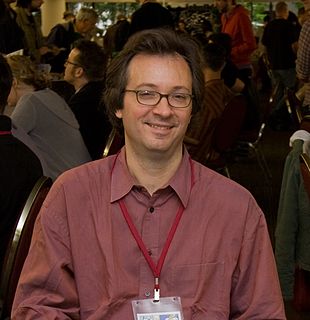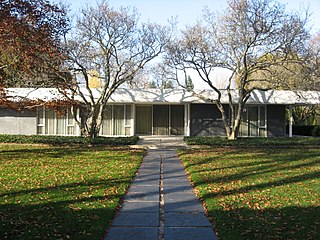Top 622 Inherited Quotes & Sayings - Page 11
Explore popular Inherited quotes.
Last updated on April 20, 2025.
I see young men, my townsmen, whose misfortune it is to have inherited farms, houses, barns, cattle, and farming tools; for these are more easily acquired than got rid of. Better if they had been born in the open pasture and suckled by a wolf, that they might have seen with clearer eyes what field they were called to labor in. Who made them serfs of the soil? Why should they eat their sixty acres, when man is condemned to eat only his peck of dirt? Why should they begin digging their graves as soon as they are born?
Among Negroes of my generation there was not only little direct acquaintance or consciously inherited knowledge of Africa, but much distaste and recoil because of what the white world taught them about the Dark Continent. There arose resentment that a group like ours, born and bred in the United States for centuries, should be regarded as Africans at all. They were, as most of them began gradually to assert, Americans. My father's father was particularly bitter about this. He would not accept an invitation to a 'Negro' picnic. He would not segregate himself in any way.
What people don't seem to ever understand is that any infrastructure that exists under your regime, in your current government, will be appropriated and inherited by the next regime. I mean, the KGB came out of the NKVD which came out of the Tsarist version of the same thing. And now, the FSB operates out of the old KGB building in Moscow. The infrastructure remains exactly the same. There's a little bit of reshuffling of personnel, and that's it. The way to make sure that there's no FSB today would have been for the Tsar to not have built an infrastructure for it in the 1800s.
The paramount doctrine of the economic and technological euphoria of recent decades has been that everything depends on innovation. It was understood as desirable, and even necessary, that we should go on and on from one technological innovation to the next, which would cause the economy to "grow" and make everything better and better. This of course implied at every point a hatred of the past, of all things inherited and free. All things superceded in our progress of innovations, whatever their value might have been, were discounted as of no value at all.
I do not even hate the Talib who shot me. Even if there was a gun in my hand and he was standing in front of me, I would not shoot him. This is the compassion I have learned from Mohammed, the prophet of mercy, Jesus Christ and Lord Buddha. This the legacy of change I have inherited from Martin Luther King, Nelson Mandela and Mohammed Ali Jinnah.
This is the philosophy of nonviolence that I have learned from Gandhi, Bacha Khan and Mother Teresa. And this is the forgiveness that I have learned from my father and from my mother. This is what my soul is telling me: be peaceful and love everyone.
There is much pain that is quite noiseless; and vibrations that make human agonies are often a mere whisper in the roar of hurrying existence. There are glances of hatred that stab and raise no cry of murder; robberies that leave man or woman for ever beggared of peace and joy, yet kept secret by the sufferer --committed to no sound except that of low moans in the night, seen in no writing except that made on the face by the slow months of suppressed anguish and early morning tears. Many an inherited sorrow that has marred a life has been breathed into no human ear.
There is something false in this search for a purely feminine writing style. Language, such as it is, is inherited from a masculine society, and it contains many male prejudices. We must rid language of all that. Still, a language is not something created artificially; the proletariat can't use a different language from the bourgeoisie, even if they use it differently, even if from time to time they invent something, technical words or even a kind of worker's slang, which can be very beautiful and very rich. Women can do that as well, enrich their language, clean it up.
The earth, in its natural, uncultivated state was, and ever would have continued to be, the common property of the human race." As the land gets cultivated, "it is the value of the improvement, only, and not the earth itself, that is in individual property. Every proprietor, therefore, of cultivated lands, owes to the community a ground-rent..to every person, rich or poor...because it is in lieu of the natural inheritance, which, as a right, belongs to every man, over and above the property he may have created, or inherited from those who did
My one-time roommate Claire had inherited the house from her uncle, and when she went off to bigger and better things, she’d left it in my care. And it needed a lot of it. Most importantly, it needed a new roof. There was a worrying stain on the ceiling of my bedroom that had started out roughly the shape of Rhode Island, but now looked more like North Carolina. Another few more days of rain and it was going to be Texas. And then it wouldn’t be anything at all because the battered old shingles were going to cave in on my head.
perhaps I possess a certain Midwestern sensibility that I inherited from my mother and her parents, a sensibility that Warren Buffet seems to share: that at a certain point one has enough, that you can derive as much pleasure from a Picasso hanging in a museum as from one that's hanging in your den, that you can get an awfully good meal in a restaurant for less than twenty dollars, and that once your drapes cost more than the average American's yearly salary, then you can afford to pay a bit more in taxes.
I see the Christian world like this: we've inherited a divided map of the truth, and each of us has a piece. Our traditions teach us that no one else has a valid map and that our own church's piece shows us all the terrain and roads that exist. In fact, there is much more terrain, more roads, and more truth for us to see if we can accept and read one another's maps, fitting them together to give us a clearer picture of the larger Christian tradition.
I feel like we've inherited modern infrastructure, and I could run away from it and become a full-time activist, or I can try to do my job, and try to talk about things I care about, and be able to do something like sponsor a topsoil conference in Nova Scotia, and talk about Bill McKibben, and narrate a documentary about the vanishing of the bees, and try to navigate my way through this world the best way possible. That's what I'm trying to figure out. Probably like many people right now.
Never an illness, nor the absence of grandeur, no, nothing is able to kill the best in us, that kindness, dear sir, we are afflicted with: beautiful is the flower of man, his conduct, and every door opens on the beautiful truth and never hides treacherous whispers. I always gained something from making myself better, better than I am, better than I was, that most subtle citation: to recover some lost petal of the sadness I inherited: to search once more for the light that sings inside of me, the unwavering light.
We have not inherited an easy world. If developments like the Industrial revolution, which began in England, and the gifts of science and technology have made life much easier for us, they have also made it more dangerous. There are threats now to our freedom, indeed to our very existence, that other generations could never even have imagined. There is first the threat of global war. No president, no Congress, no prime minister, no parliament can spend a day entirely free of this threat. If history teaches anything, it teaches self-delusion in the face of unpleasant facts is folly.
In the search for character and commitment, we must rid ourselves of our inherited, even cherished biases and prejudices. Character, ability and intelligence are not concentrated in one sex over the other, nor in persons with certain accents or in certain races or in persons holding degrees from some universities over others. When we indulge ourselves in such irrational prejudices, we damage ourselves most of all and ultimately assure ourselves of failure in competition with those more open and less biased.
We have inherited a fear of memories of slavery. It is as if to remember and acknowledge slavery would amount to our being consumed by it. As a matter of fact, in the popular black imagination, it is easier for us to construct ourselves as children of Africa, as the sons and daughters of kings and queens, and thereby ignore the Middle Passage and centuries of enforced servitude in the Americas. Although some of us might indeed be the descendants of African royalty, most of us are probably descendants of their subjects, the daughters and sons of African peasants or workers.
How can the physique be braced if no fresh breath from the outer world is suffered to permeate the languid, enervating air of thedrawing-room? How can the grasp of the mind be vigorous, without action? Daughters of inherited wealth, or accumulated labor! the wide door of philanthropy is open peculiarly to you! Your life-work lies beyond your threshold: your wealth has placed you above the sorrowful struggle for daily bread which takes up the whole time of so many of your brothers and sisters. You are the almoners of God. A double accountability is yours.
You might tell me that you have been engaging in some deep questioning and theological rethinking.1 You can no longer live with the faith you inherited from your parents or constructed earlier in your life. As you sort through your dogma and doctrine, you’ve found yourself praying less, less thrilled about worship, scripture, or church attendance. You’ve been so focused on sorting and purging your theological theories that you’ve lost track of the spiritual practices that sustain an actual relationship with God. You may even wonder if such a thing is possible for someone like you.
Resolution Trust Company was set up to liquidate a bunch of assets that the government had inherited because the savings and loans went broke. So the savings and loans went broke, the government stepped in, paid off depositors, and now they're left with this mass of assets to sell. We're not talking about selling here, we're talking about buying intelligently. They were selling what they got handed to them by a bunch of savings and loan operators that had in many cases had done some very dumb thing. But their job was to liquidate it. And they liquidated.
Evolutionary biologists often appeal to parsimony when they seek to explain why organisms "match" with respect to a given trait. For example, why do almost all the organisms that are alive today on our planet use the same genetic code? If they share a common ancestor, the code could have evolved just once and then been inherited from the most recent common ancestor that present organisms share. On the other hand, if organisms in different species share no common ancestors, the code must have evolved repeatedly.
Many Southern Plantation owners were working towards the day when they could convert their investment to more profitable industrial production as had been done in the North, and others felt that freemen who were paid wages would be more efficient than slaves who had no incentive to work. For the present, however, they were stuck with the system they inherited. They felt that a complete and sudden abolition of slavery with no transition period would destroy their economy and leave many of the former slaves to starve - all of which actually happened in due course.





















